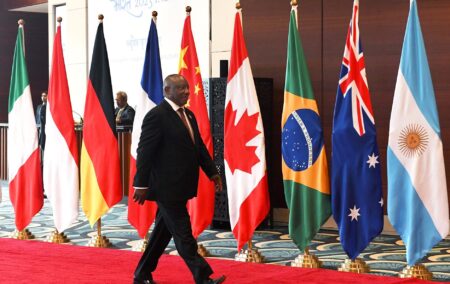When South Africa assumes the presidency of the G20 on 1 December, it gains a position that will afford the country, and the Government of National Unity (GNU), numerous economic, investment, trade, diplomatic, and strategic opportunities.
The scale of the opportunity is best perceived against the reasonable assessment that attaining the above-3% GDP growth target by 2025 set by government and business, will require, among other things, attracting significantly higher levels of fixed investment and Gross Fixed Capital Formation (GFCF) – particularly from abroad.
As a percentage of GDP, the latter reached a high point of 21.6% around 2008/09 but remained between 10-15% for all years since. The National Development Plan’s 2030 target is 30%.
With geopolitical tensions and uncertainties increasing steadily, and with both China and the European Union facing serious growth challenges over the short-to-medium term, South Africa has before it an immense opportunity not only for domestic reforms that would encourage capital formation and job creation, but also to be one of (if not the) leading actor in an accelerated implementation of the Africa Continental Free Trade Area (AfCFTA).
However, attaining these potentially positive outcomes, with the G20 presidency bolstering every opportunity to work towards them, presumes the government plays its diplomatic and geopolitical hands well. The evidence of this has yet to be seen.
A case in point is Pretoria’s conduct in Southeast Asia.
While it does not carry the same label as an “embassy” would, the Taipei Liaison Office in South Africa has served as Taiwan’s de facto embassy since 1998. Reporting by Peter Fabricius for Daily Maverick indicates that the South African government has “insisted” Taiwan move the Liaison Office out of Pretoria by the end of October. It is as yet unclear whether the government is acting under pressure exerted by People’s Republic of China, although this has widely been claimed. Subsequent reporting has suggested that approaches by countries with cordial relations with Taiwan and extensive interests in South Africa – such as Japan – have been rebuffed by the government.
Risking much
Strategically and economically, South Africa stands to gain very little from this move but is risking much both technologically and diplomatically. While it is a risk that is by no means to be dismissed, Chinese demand for South African exports (especially commodities) will not be summarily suspended should the government not force this move against Taiwan.
However, the damage to South Africa’s diplomatic and geopolitical standing could prove to be substantial. The Liaison Office, its history and location, mean more to Taiwan than its continuing to occupy its present accommodation would mean to China.
For Taiwan, under mounting economic and diplomatic pressure by China, South Africa’s acceptance of the Office in its current location would send a principled, and precedent-setting, signal. For other current and potential allies of South Africa, such a move would also indicate that the government takes its foreign policy and geopolitical commitments seriously. Equally pertinently, it would indicate that South holds a genuine commitment to its “non-aligned” positioning.
With global tensions rising – not least in the Taiwan Strait – very sober assessments of the consequences of Pretoria’s diplomatic choices are called for. Despite the South African government’s at times outsized significance on the global stage, there is as yet little reason to believe that it has a clear understanding of the concerns of many quite different countries with which it has relations. Too often, it seems to default to a dogmatic form of ideological and geopolitical thinking. This is unconducive to productive and economically fruitful relationships with partners of all stripes.
Another matter entirely
It’s one thing to talk about “non-alignment”. As South Africa continues to navigate more tension-filled geopolitics, practising such behaviour is another matter entirely. President Cyril Ramaphosa’s statement at the recent BRICS summit in Kazan, Russia, reflected a fulsome embrace of Russia: “We continue to see Russia as a valued ally, as a valued friend who supported us right from the beginning, from the days of our struggle against apartheid, right through to now.”
Likewise, South Africa’s oft-stated (but not necessarily always supported by action) enthusiasm for multilateral institutions requires a degree of understanding of its interlocutors and their interests – and how these intersect with those of others – that it does not always demonstrate.
With global trade and diplomatic relations in more flux than they have been for a generation, those countries that practise what they preach will benefit in terms of increased international appeal and reliability. The medium-term outlook is one of increased geopolitical tensions, disruptions and rapidly shifting trade and investment flows.
Developed economies such as the US and the EU, as well as the high-growth economy of China, are facing a difficult next few years. This means that investors will be on the lookout for emerging markets with greater upside potential. This is an opportunity South Africa should leverage. The span of South Africa’s G20 presidency is one such (possibly generational) opportunity.
[Image: President Cyril Ramaphosa arrives at the Bharat Mandapam International Exhibition Convention Centre for the 2023 G20 summit https://www.flickr.com/photos/governmentza/53178833347/in/photostream/]
If you like what you have just read, support the Daily Friend


